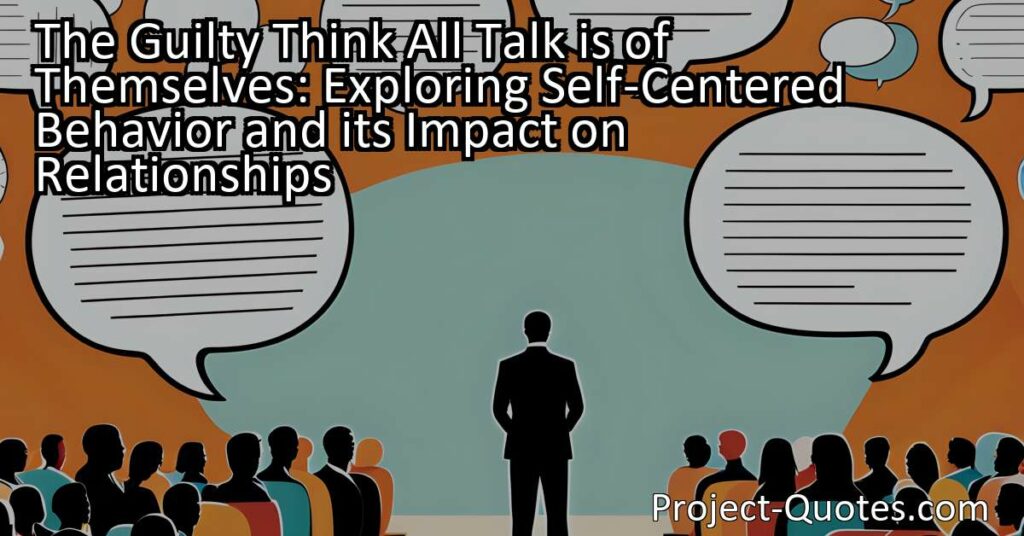The guilty think all talk is of themselves.
Geoffrey Chaucer
This article delves into the concept of guilt, how it leads to self-centered behavior, and the negative effects it has on interpersonal connections. By recognizing and addressing this mindset, individuals can foster healthier relationships and personal growth.
Table of Contents
Meaning of Quote – The guilty think all talk is of themselves.
Have you ever come across people who can’t seem to stop talking about themselves? They have this incessant need to be the center of attention and believe that every conversation must revolve around them. Well, the quote “The guilty think all talk is of themselves” perfectly encapsulates this behavior. In this article, we will explore the underlying ideas behind this quote, examining why some individuals have an overwhelming tendency to focus on themselves and how it can affect their relationships with others.
To truly understand the meaning of this quote, we must first delve into the concept of guilt. Guilt is a powerful emotion that arises when one believes they have done something wrong or failed to meet certain expectations. It can be a burden that weighs heavily on their conscience, leading them to constantly think about their actions and how others perceive them. When feeling guilty, individuals often become self-absorbed, as their minds are consumed by their own insecurities and doubts.
Now, let’s imagine a scenario where someone feels guilty about a particular event or action. Their guilt acts as a filter when it comes to interpersonal communication, making them hypersensitive to any mention of the topic related to their wrongdoing. In this state, they assume that every conversation is about them, and any innocent remark can be perceived as a direct reference to their guilt. It’s almost as if they are trapped in their own bubble, constantly hearing echoes of their own misdeeds.
This self-centered focus can have significant implications on their relationships with others. People who constantly think all talk is about themselves may inadvertently push away friends and loved ones. Their inability to engage in meaningful discussions that don’t relate to their personal guilt can make others feel unheard, undervalued, and unimportant. After all, who wants to be around someone who only cares about themselves and dismisses the feelings and experiences of those around them?
Furthermore, this behavior can lead to a lack of perspective and empathy. When consumed by their guilt, individuals tend to lose sight of the broader picture and fail to consider the viewpoints and emotions of others. This self-centered mindset can inhibit personal growth and prevent meaningful connections from developing. Instead of taking responsibility for their actions and seeking to understand others, they remain trapped in a cycle of self-interest and self-preservation.
It is essential to recognize that the tendency to think all talk is about oneself is not only detrimental to interpersonal relationships but also to personal growth. When individuals are unwilling to step out of their self-centered mindset, they limit their opportunities for self-reflection and improvement. Growth occurs when we are open to feedback, willing to listen to others without assuming everything revolves around us. By shifting the focus away from ourselves, we can foster stronger connections, gain new insights, and expand our understanding of the world.
So how can we break free from the trap of thinking all talk is about ourselves? The first step is cultivating self-awareness. Recognizing our own tendencies to be self-absorbed allows us to catch ourselves in the act and make a conscious effort to redirect the conversation. Practicing active listening is another valuable skill. Engaging in conversations with the intent to understand rather than waiting for our turn to speak can help us truly connect with others and develop meaningful relationships.
Additionally, learning to embrace vulnerability can counteract the tendency to be excessively self-focused. Opening up about our own struggles and insecurities can create a space for empathy and mutual understanding. When we share our experiences with others, we invite them to do the same, leading to deeper connections and a broader perspective.
In conclusion, the quote “The guilty think all talk is of themselves” sheds light on the self-centered behavior that often arises from feelings of guilt. Individuals who constantly think conversations revolve around them inadvertently distance themselves from others, hinder personal growth, and limit their capacity for empathy. By cultivating self-awareness, practicing active listening, and embracing vulnerability, we can break free from this mindset and foster healthier, more authentic relationships. Remember that conversations are an opportunity to learn, connect, and appreciate the experiences of others, so let’s strive to make them as inclusive and fulfilling as possible.
I hope this quote inspired image brings you hope and peace. Share it with someone who needs it today!


